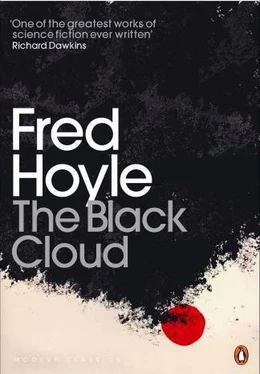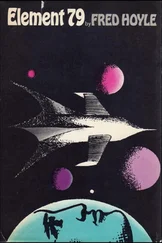Fred Hoyle - The Black Cloud
Здесь есть возможность читать онлайн «Fred Hoyle - The Black Cloud» весь текст электронной книги совершенно бесплатно (целиком полную версию без сокращений). В некоторых случаях можно слушать аудио, скачать через торрент в формате fb2 и присутствует краткое содержание. Жанр: Фантастика и фэнтези, на английском языке. Описание произведения, (предисловие) а так же отзывы посетителей доступны на портале библиотеки ЛибКат.
- Название:The Black Cloud
- Автор:
- Жанр:
- Год:неизвестен
- ISBN:нет данных
- Рейтинг книги:5 / 5. Голосов: 1
-
Избранное:Добавить в избранное
- Отзывы:
-
Ваша оценка:
- 100
- 1
- 2
- 3
- 4
- 5
The Black Cloud: краткое содержание, описание и аннотация
Предлагаем к чтению аннотацию, описание, краткое содержание или предисловие (зависит от того, что написал сам автор книги «The Black Cloud»). Если вы не нашли необходимую информацию о книге — напишите в комментариях, мы постараемся отыскать её.
The Black Cloud — читать онлайн бесплатно полную книгу (весь текст) целиком
Ниже представлен текст книги, разбитый по страницам. Система сохранения места последней прочитанной страницы, позволяет с удобством читать онлайн бесплатно книгу «The Black Cloud», без необходимости каждый раз заново искать на чём Вы остановились. Поставьте закладку, и сможете в любой момент перейти на страницу, на которой закончили чтение.
Интервал:
Закладка:
Joe’s first message ran roughly as follows:
“Your first transmission came as a surprise, for it is most unusual to find animals with technical skills inhabiting planets which are in the nature of extreme outposts of life.”
Joe was asked why this should be so.
“For two quite simple reasons. Living on the surface of a solid body, you are exposed to a strong gravitational force. This greatly limits the size to which your animals can grow and hence limits the scope of your neurological activity. It forces you to possess muscular structures to promote movement, and it also forces you to carry protective armour against sharp blows — as for instance your skulls are a necessary protection for your brains. The extra weight of muscle and armour still further reduces the scope of your neurological activities. Indeed your very largest animals have been mostly bone and muscle with very little brain. As I have already said, the strong gravitational field in which you live is the cause of this difficulty. By and large, one only expects intelligent life to exist in a diffuse gaseous medium, not on planets at all.
“The second unfavourable factor is your extreme lack of basic chemical foods. For the building of chemical foods on a large scale starlight is necessary. Your planet, however, absorbs only a very minute fraction of the light from the Sun. At the moment I myself am building basic chemicals at about 10,000,000,000 times the rate at which building is occurring on the whole entire surface of your planet.
“This shortage of food chemicals leads to a tooth-and-claw existence in which it is difficult for the first glimmerings of intellect to gain a foothold in competition with bone and muscle. Of course once intelligence becomes firmly established, competition with sheer bone and muscle becomes easy, but the first steps along the road are excessively difficult — so much so that your own case is a rarity among planetary life forms.”
“And so much for the space travel enthusiasts,” said Marlowe. “Ask him, Harry, to what we owe the emergence of intelligence here on the Earth.”
The question was put, and after a time the answer came:
“Probably to the combination of several circumstances, among which I would rate as most important the development about fifty million years ago of an entirely new type of plant: the plant that you call grass. The emergence of this plant caused a drastic reorganization of the whole animal world, owing to the peculiarity that grass can be cropped to ground level, in distinction from all other plants. As the grasslands spread over the Earth those animals that could take advantage of this peculiarity survived and developed. Other animals declined or became extinct. It seems to have been in this major reshuffle that intelligence was able to gain its first footing on your planet.
“There are several very unusual factors that made the decoding of your method of communication a matter of some difficulty,” went on the Cloud. “Particularly I find it most strange that your communication symbols do not bear any really close connexion with the neurological activity in your brains.”
“We’d better say something about that,” remarked Kingsley.
“I bet we had. I didn’t think you’d be able to keep quiet for long, Chris,” Ann Halsey remarked.
Kingsley explained his idea about A.C. and D.C. communication, and asked whether Joe himself operated on an A.C. basis. Joe confirmed that this was so and continued:
“This is not the only quaint feature. Your outstanding oddity is the great similarity of one individual to another. This allows you to use a very crude method of communication. You attach labels to your neurological states — anger, headache, embarrassed, happy, melancholy — these are all labels. If Mr A wishes to tell Mr B that he is suffering from a headache he makes no attempt to describe the neurological disruption in his head. Instead he displays his label. He says:
“ “I have a headache.”
“When Mr B hears this he takes the label “headache” and interprets it in accordance with his own experience. Thus Mr A is able to acquaint Mr B of his indisposition even though neither party may have the slightest idea what a “headache” really consists of. Such a highly singular method of communication is of course only possible between nearly identical individuals.”
“Could I put it this way?’ said Kingsley. “Between two absolutely identical individuals, if that were possible, no communication at all would be necessary because each individual would automatically know the experience of the other. Between nearly identical individuals a quite crude method of communication suffices. Between two widely different individuals a vastly more complicated communication system is required.”
“That is exactly what I was trying to explain. The difficulty I had in decoding your language will now be clear. It is a language suited to nearly similar individuals, whereas you and I are widely separated, much more widely than you probably imagine. Fortunately your neurological states seem rather simple. Once I had managed to understand them in some degree, the decoding became possible.”
“Do we have anything neurological in common? Do you, for instance, have anything that corresponds to our “headache”?’ asked McNeil.
The reply came:
“In a broad sense we share the emotions of pleasure and pain. But this is only to be expected of any creature that possesses a neurological complex. Painful emotions correspond to a sharp disruption of neurological patterns, and this can happen with me as well as with you. Happiness is a dynamic state in which neurological patterns are being extended, not disrupted, and this too can happen with me as well as with you. Although there are these similarities, I imagine that my subjective experiences are very different from yours, except in one particular — like you I regard painful emotions as emotions that I wish to avoid, and vice versa for happy emotions.
“More specifically, your headaches arise from a faulty blood supply that destroys the precision of the electrical firing sequences in your brain. I experience something very akin to a headache if radio-active material gets into my nervous system. It causes electrical discharges in much the way that happens in your Geiger counters. These discharges interfere with my timing sequences and produce an extremely unpleasant subjective experience.
“Now I wish to inquire into quite a different matter. I am interested in what you call “the arts”. Literature I can understand as the art of arranging ideas and emotions in words. The visual arts are clearly related to your perception of the world. But I do not understand at all the nature of music. My ignorance in this respect is scarcely surprising, since as far as I am aware you have transmitted no music. Will you please repair this deficiency?”
“Here’s your chance, Ann,” said Kingsley. “And what a chance! No musician ever played to an audience like this!”
“What shall I play?”
“How about the Beethoven you played the other night?”
“The Opus 106? It’s a bit fierce for a beginner.”
“Come on, Ann. Give old Joe the works,” encouraged Barnett.
“There’s no need to play if you don’t want to, Ann. I took a recording,” said Leicester.
“What’s the quality like?”
“As good as we’ll get it from a technical point of view. If you were satisfied with the performance we can start transmitting more or less straight away if you wish.”
“I think I’d prefer you to use the recording. It sounds ridiculous, but I’ve an idea that I might be nervous if I started to play to that thing, whatever it is.”
“Don’t be silly. Old Joe won’t bite.”
Читать дальшеИнтервал:
Закладка:
Похожие книги на «The Black Cloud»
Представляем Вашему вниманию похожие книги на «The Black Cloud» списком для выбора. Мы отобрали схожую по названию и смыслу литературу в надежде предоставить читателям больше вариантов отыскать новые, интересные, ещё непрочитанные произведения.
Обсуждение, отзывы о книге «The Black Cloud» и просто собственные мнения читателей. Оставьте ваши комментарии, напишите, что Вы думаете о произведении, его смысле или главных героях. Укажите что конкретно понравилось, а что нет, и почему Вы так считаете.












